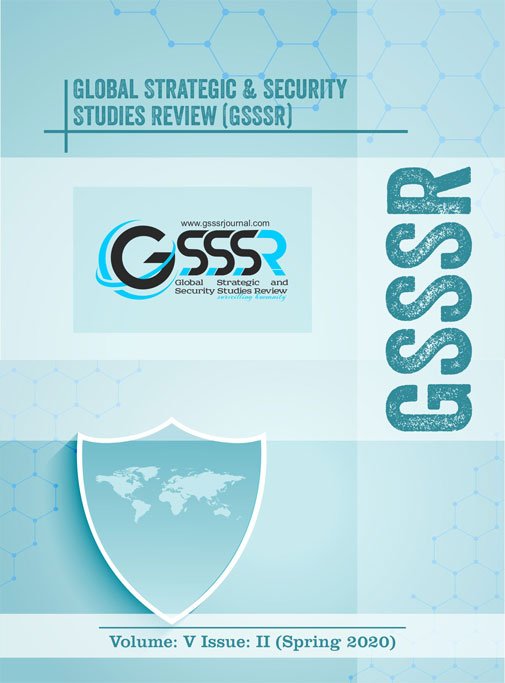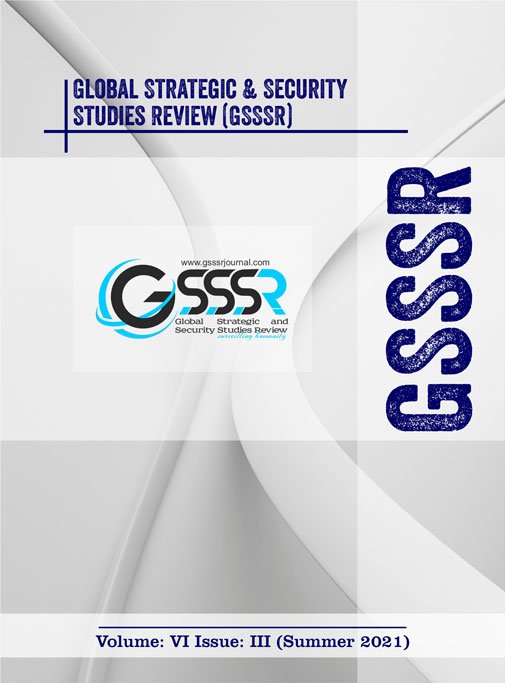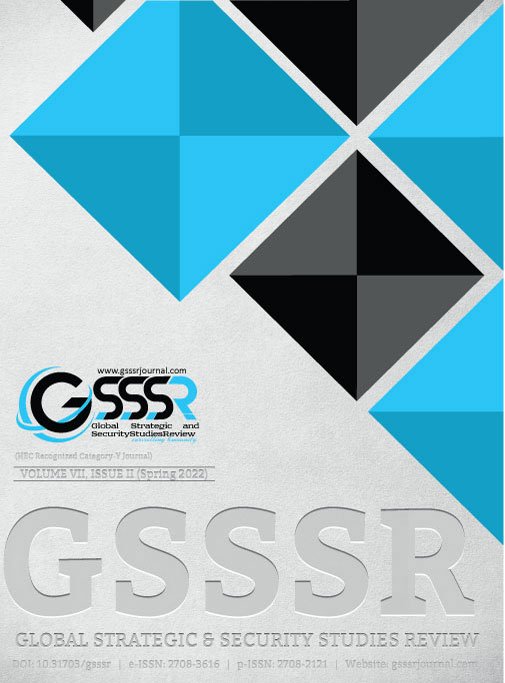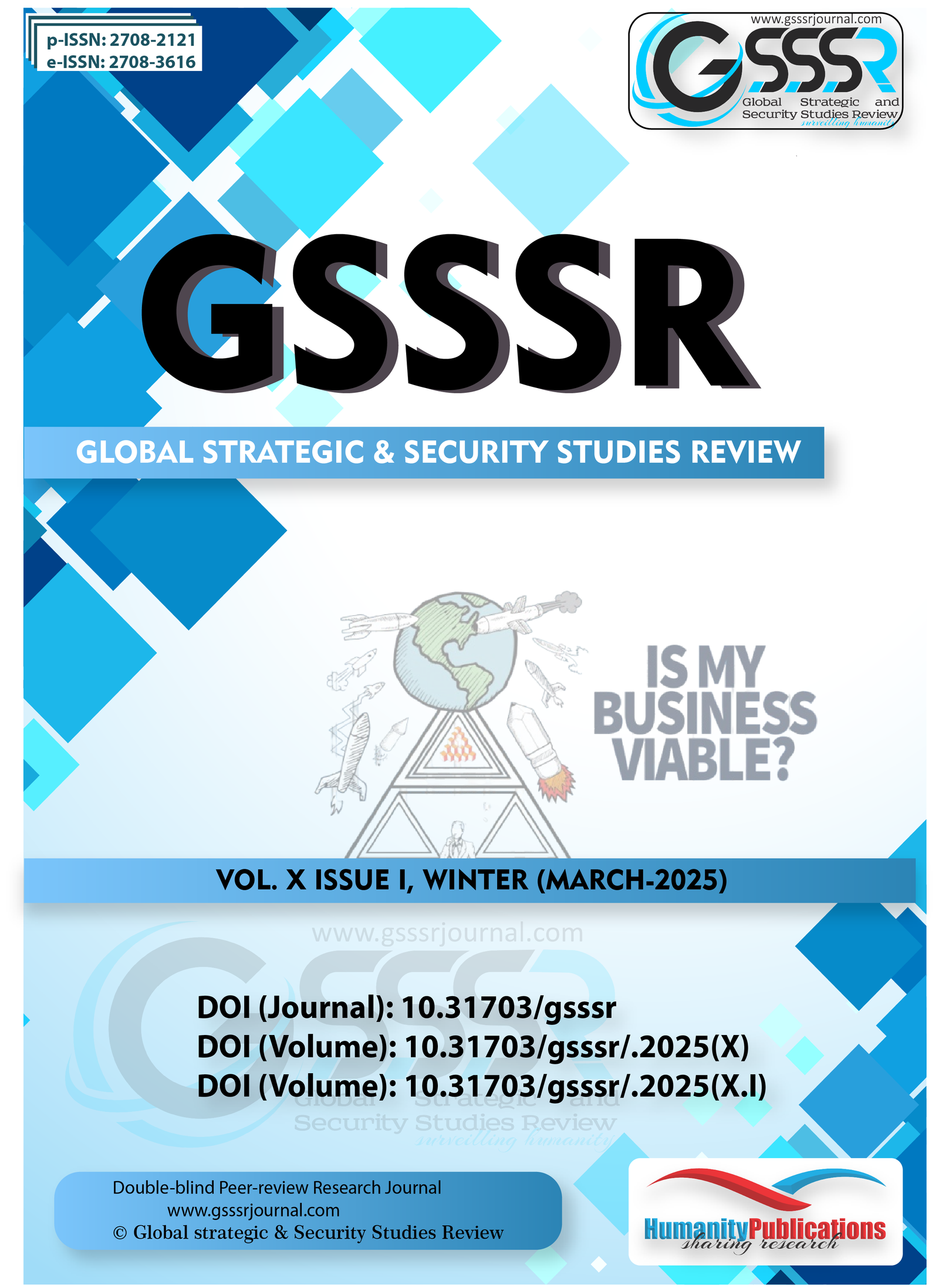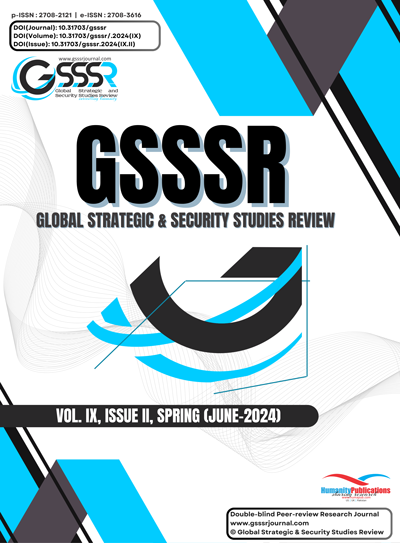
Global Strategic & Security Studies Review
-
Address
Office #1,2, First Floor, Fazal Arcade,
F-11 Markaz, Islamabad, Pakistan. -
Email address
managingeditor@gsssrjournal.com
Monday to Friday 9am - 7pm -
Contact information
info@gsssrjournal.com, +92 332 9147618
Monday to Sunday 24 Hours
- Publishing research Since2016
- Publication FrequencyQuarterly
- Access TypeOpen Access
Global Strategic & Security Studies Review (GSSSR) is published by Humanity Publications, a leading publishing house in Pakistan in research and analytics, that assists researchers in advancing research outcomes for societal benefit. To wipe out societal ills and to add the humanity by boosting up measures among the individuals of the global society.. GSSSR intends to promote a wide range of research practices with the help of newly emergent tools and patterns utilized in experiments, observations, interviews, analysis, and surveys in the leading research studies. Therefore, it subsumes all major segments of security and strategic studies. GSSSR is a quarterly, double-blind, and peer-reviewed research journal that focuses on security issues across the globe that incorporates major areas of security and strategic matters i.e. International Relations, strategic studies, Organizational studies, Security and policy studies, Geopolitics, Intelligence studies, Military and Warfare studies, and propaganda studies. Further details are available at www.gsssrjournal.com
Global Strategic & Security Studies Review (GSSSR)
(Strategy, Security, and Peace)
Global Strategic & Security Studies Review (GSSSR) was introduced by Humanity Only (HO) through the research project sponsored and guided by the Humanity Research Council (HRC) - a sub-body of Humanity Development Society (HDS). GSSSR intends to promote a wide range of research practices with the help of newly emergent tools and patterns utilized in experiments, observations, interviews, analysis, and surveys in the leading research studies. Therefore, it subsumes all major segments of security and strategic studies. GSSSR is a quarterly, triple-blind, and peer-reviewed research journal that focuses on security issues across the globe that incorporates major areas of security and strategic matters i.e. International Relations, strategic studies, Organizational studies, Security and policy studies, Geopolitics, Intelligence studies, Military and Warfare studies, and propaganda studies. Further details are available at www.gsssrjournal.com.
Vision and Mission
GSSSR aims to become one of the leading research platform of scholarship on global security and strategic studies in the world through dynamic research activities including conduct of international conferences on security issues and publishing quality research studies. To create such a platform where the researchers and academicians will explore the issues of security and strategic studies that will trigger the creation and promotion of new ideas related to global security, peace, and conflict.
Objectives & Focus
GSSSR promotes:
- Advancement of research in all sectors of War and peace
- High-quality publications in theoretical and empirical researches
- Networking of academicians, researchers and professionals encourage different genres in creative and research writing
- Finding out the causes and consequences of wars conflicts and it means of resolutions.
Scope
GSSSR covers security and strategic, inter-disciplinary, and trans-disciplinary issues and problems of security and strategic concerns. It welcomes articles covering social sciences, in general, and security and strategic studies specifically. Therefore, it covers all issues related to International Relations, strategic studies, Organizational studies, Security and policy studies, Geopolitics, Intelligence studies, Military and Ware fare studies, and propaganda studies.
Values
GSSSR is committed to the highest values in research publications. It encourages Clarity, Efficiency, Excellence, Integrity, Honesty, Truth, and Professionalism in the articles submitted for publication. GSSSR has incorporated all these values into the process of selection and review.
This paper provides a scholarly discourse on the lasting importance and theoretical complexity of the security dilemma in international relations. Taking inspiration from classical realism, neorealism, and social constructivism, it extrapolates the dual dimensions of the dilemma in terms of interpretation and response, signifying the process in which uncertainty and... read more
PDF Full TextJournal Metrics
Journal Indexing
Scope
SCOPE
Global Strategic & Security Studies Review - (GSSSR) entertains papers in the following domains (but not limited to) of Human Society
International Relations
1. International politics
2. International law
3. International political economy
4. Foreign Policy
5. Global studies
6. Diplomacy
Strategic Studies
1. Global Strategic Issues
2. World Geo - Strategy
3. Arms Control and Disarmament
4. Deterrence Regimes
5. Non Proliferations Issues
6. Nuclear Developments
7. Strategic Trends
Organizational Studies
1. International governmental organization (IGO's)
2. Non-Governmental organization (NGO's)
3. Multinational Corporation (MNC's)
Security and Policy Studies
1. Public Policies
2. Public administration
3. Peace and conflict studies
4. National Security Policy
5. Defense Policy
6. Military Strategy
7. Peace and Conflict Studies
8. UN Peace Keeping Operation
9. Non Traditional Security Issues
Geopolitics
1. Human geography
2. Political geography
3. Economic geography
4. Cultural geography
5. Military geography
6. Strategic geography
Intelligence Studies
1. Espionage
2. Artificial Intelligence
3. International security
4. Competitive Intelligence
5. Business Intelligence
6. Market Intelligence
7. Scientific and Technical Intelligence
8. Collective Intelligence
Military & Warfare Studies
1. Modern Warfare
2. Hybrid War
3. War Schools & Colleges
4. Military Art and Capacity
Editorial Board

Dr. Mansoor Akbar Kundi, Professor, Department of Politics and International Relations, International Islamic University, Islamabad, Pakistan.
dera1955@gmail.com

Dr. Muhammad Tehsin, Associate Professor, Department of Defence & Strategic Studies, Quaid-i-Azam University Islamabad Pakistan
tehsin@qau.edu.pk

Dr. Surat Khan, Assistant Professor, Department of Political Science , University of Lakki Marwat, KPK, Pakistan.
surat@ulm.edu.pk

Dr. Bakhtiar Khan, Assistant Professor, Department of Political Science, University of Buner, KP, Pakistan.
bakhtiar@ubuner.edu.pk
Advisory Board

Dr. Umbreen Javed, Professor, Centre for South Asian Studies, University of the Punjab, Lahore, Pakistan.
umbreen.polsc@pu.edu.pk

Dr. Shafiq Qurban, Asistant Professor, Departmental of Political Science and International Relations, University of Management and Technology, Lahore.
shafiquequrban@hotmail.com

Dr. Zahid Ali Khan Marwat, Professor / Dean, Faculty of Social Sciences, Abdul Wali Khan University Mardan.
zahidmarwat62@gmail.com

Dr. Sami Raza zaidi, Associate Professor, International Relations University of Peshawar, KP, Pakistan.
samiraza@uop.edu.pk

Naveed Rafaqat Ahmad, Chartered Accountant, Certified Finance & Business Analyst (UK) | Certified Director, SECP Pakistan, Chief Executive Officer, Punjab Model Bazaars Management Company.
chiefeditor@gsssrjournal.com
Archives
The paper elucidates the conflict zone 'Afghanistan' fundamentally divided in two high land and low land climate. from internal perspective and elaborates the inherent issues and internal dynamics of the state that are tormenting its stability. The unit of analysis is state structure and its changing dynamics due to sudden and abrupt shift of power and change in internal dynamics. The explorato... read more
PDF Full Text Views (6098)The study is intended to describe the newly emerging wave of cyber security threats under the conception of Surveillance Capitalism, which was initially defined by a Harvard university professor, Shoshana Zuboff. The idea of Zuboff emphasizes the use of various formats of data collected from different android software applications that can help regulate the political, social, and economic orien... read more
PDF Full Text Views (3380)South China Sea is a region of interest for both China, US and many other nations. For China, the South China sea is as important as the Caribbean Sea was important for the US in the first Cold War. The US, through small states near the South China Sea like Taiwan, Philippines, and Vietnam and japan spar Chinese hegemony in the region. China is ready to transgress international law when things ... read more
PDF Full Text Views (2660)The rise of China economically, technologically and militarily has become an alarming threat for the superpower of the present century. The US is fighting a new Cold War to retain her hegemony all over the world. The policies of the new Cold War are quite different from those of the old Cold War. First Cold War was an ideological clash between the US and USSR, but the new Cold War is purely the... read more
PDF Full Text Views (2608)Since the announcement of "US pivot to Asia" and "Belt and Road Initiative" (BRI), both remained a center of debate in international politics both regional and global, policy making, academia, news both print and electronic media. Many people including academic experts, researchers, have written about USA pivot to Asia and BRI initiative from different perspectives. This research paper as an at... read more
PDF Full Text Views (2537)Public protests, agitations and demonstrations are part of the democratic political process. It shapes the polity of a country and transforms social, political and economic aspects. In Pakistan's history, protest or pressure politics has played a significant role. Significant protests in Pakistan have been held against 'election riggings' including the recent one against 2013 general elections ... read more
PDF Full Text Views (2013)This article offers a strategy that explores the idea of a Hybrid World War and how it can be applied to the current military struggle between China and the US. The global capitalist system, which arose as a worldwide framework for production, trade, and finance between the 16th and 18th centuries, is factored into the Hybrid World War concept in a way that the new-fangled Cold War was not. In ... read more
PDF Full Text Views (1972)Inculcating the spirit of patriotism and breeding a positive sentiment for war through national songs is a commonplace practice after Second World War. These songs are helpful in developing patriotic morals and cultural values of any nation. Pakistan has fought many wars since its independence and still war is an omnipresent threat. This study analyzes the strategic importance of introducing re... read more
PDF Full Text Views (1847)By looking at the institutional settings of SCO, it is believed that this organization has a huge potential to maximize cooperation and minimize conflicts among the member states. Founded under the leadership of Russia and China, SCO extended not only the opportunities and roadmaps for promoting bilateral trade and security collaborations of the mentioned countries but also helped promoted regi... read more
PDF Full Text Views (1769)China claims that it's rise is different from other great powers: a benign and responsible power striving for just order and peaceful development. This paper raises question that why has China resorted to soft power mechanisms? What are the strategies that it employs to project soft image? And finally, how is soft power helpful in portraying China as a power distinct from the status quo powers?... read more
PDF Full Text Views (1723)Afghanistan has been in a state of perpetual civil war since the late 1970s, marked by foreign occupation in the form of two invasions: the Soviet invasion in 1979 and the US-led invasion in 2001 that overthrew the Taliban administration. Afghanistan's ability to affect neighboring countries' politics and societies has increased its significance. This study uses information gathered from second... read more
PDF Full Text Downloads (1)The United States is increasingly active in the Asia-Pacific region to safeguard its global interests. As China’s economic power grows, it is posing challenges to U.S. hegemony. In response, the U.S. has formed alliances like AUKUS and the QUAD, emphasizing its Asia-Pacific policy to counter China. In contrast, China is expanding its economic influence by investing in infrastructure... read more
PDF Full Text Downloads (1)The study tests the validity of the environmental Kuznets curve (EKC) for SAARC countries by using closed and open economy Models. The Peroni Panel Cointegration technique along with FMOLS estimation techniques have been used for empirical analysis by using the data from 1972-2015. The long run and short run estimates of the closed economy model reveals positive and significant relationship bet... read more
PDF Full Text Downloads (1)This paper discusses water war thesis. It argues that water war thesis is loosely based on the arguments by different world leaders, and writers which state that the new fault lines between states will be drawn on waters. The basic premise of the water war thesis rests on the argument of water crisis; the demand-supply gap will make states thirsty for water. It asserts that as climate changes u... read more
PDF Full Text Downloads (0)Pakistan had a long historical background as a host country for Afghan refugees from the 1970s Soviet-Afghan to after the US withdrawal from Afghanistan. Pakistan has been a host to one of the largest refugee populations in the world, with millions of Afghan refugees living in the country for decades. With the passage of time, Pakistan is facing security threats internal as well as external. So... read more
PDF Full Text Downloads (0)Human Security is one of the complex challenges in South Asian region which has been continuously neglected by the policymakers due to the lack of state-centric comprehensive tendencies for the regional security paradigms. In this context, this research work attempts to encourage hostile South Asian nation-states to amend their hostile state-centric behaviors towards people-centric approaches f... read more
PDF Full Text Downloads (0)The paper investigates the PRC interests being developed in China Pakistan Economic Corridor since long its announcement in 2015. The study also analysis the factors that led to the adoption of policy being chalk out for the joint venture of CPEC. Beijing articulated its interests under the prism of political, security, economic and strategic perspectives. The Western World comprehended Chinese... read more
PDF Full Text Downloads (0)Sino-Russian military cooperation has a long history stemming from their shared ideological leanings during the twentieth century. However, this military cooperation has evolved greatly, especially during the last two decades during which this multifaceted cooperation has emerged as a balancing force to US unipolar hegemony since the end of the cold War. This... read more PDF Full Text Downloads (0)
The rise of China economically, technologically and militarily has become an alarming threat for the superpower of the present century. The US is fighting a new Cold War to retain her hegemony all over the world. The policies of the new Cold War are quite different from those of the old Cold War. First Cold War was an ideological clash between the US and USSR, but the new Cold War is purely the... read more
PDF Full Text Downloads (0)Insurgency is a violent political struggle borne out of grievances in a local community. The phenomenon of insurgency is old and the ways of tackling insurgencies have always been studied with interest. Pakistan has faced sporadic insurgencies in its Balochistan province. This study applies conceptual framework propounded by Scott Moore to Balochistan insurgency and analyzes the complex combina... read more
PDF Full Text Downloads (0)




